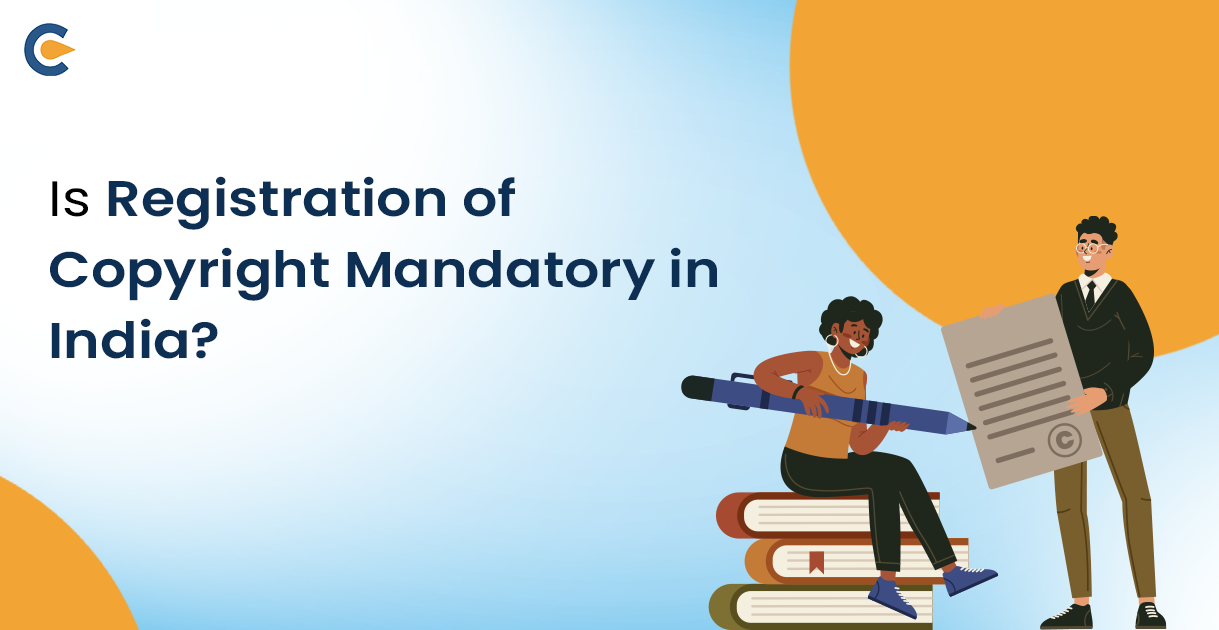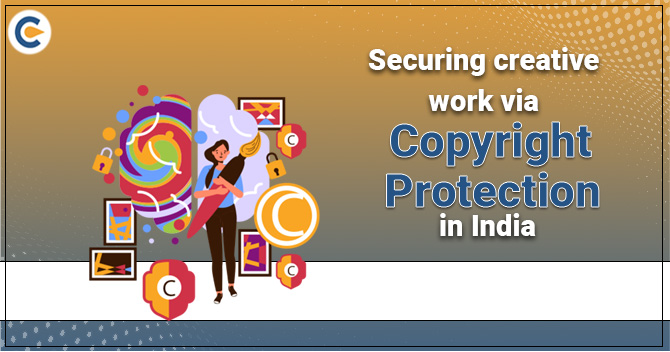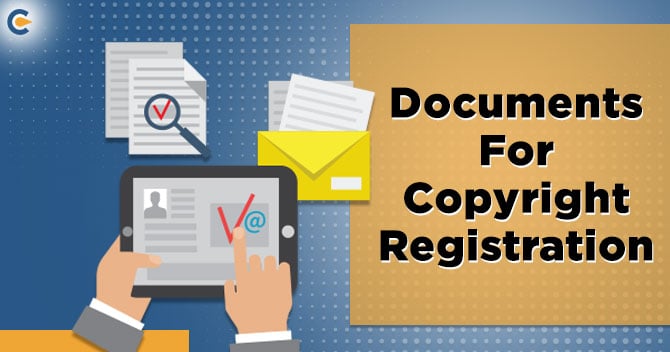A copyright is a statutory right or privilege granted to the owner, maker, composer, curator, etc. of a literary, artistic, musical, dramatic, or cinematographic work that is granted by the Government. A Copyright signifies and ensures that no person other than the original creator shall be allowed to use or exploit the copyright for the purpose of extracting monetary benefits from its use without paying a due royalty amount. If the person makes unauthorized use of the copyright, it is known as an infringement of copyright, and the person can face imprisonment as well as a liability to pay fines.
A Copyright is governed by the Copyright Act of 1957 and remains valid for a period of 60 years after the death of the owner or creator of the work. After the expiry of said period of 60 years, the copyright becomes a property in public property.
Is Registration of Copyright Mandatory?
Copyright is not a mandate but a prerogative right of the copyright maker. The artist or maker of the copyright can choose to register the copyright or not. An international agreement known as the Agreement on Trade-Related Aspects of Intellectual Property Rights [1](TRIPS), signed in 1994, laid down the covenant related to the registration of copyright that a copyright becomes existent right after the work is perceived. Hence, the copyright must be granted automatically and not based upon any formality or need of any formal registration procedures.
The covenants of the TRIPS Agreement have been translated in Section 45(I) of the Copyright Act, which mentions that the author or publisher interested in the Copyright of any work may make an application in the prescribed format and form which is accompanied by a prescribed form. The use of the word ‘may’ signifies the discretionary requirement to register a copyright as per the law. This does not cast any obligation on the holder of the copyright to register their work. Further, Section 51 of the Copyright Act propounds that copyright protection does not restrict itself to only registered copyrights but also includes unregistered copyrights.
A judgment of the Bombay High Court even further strengthened this notion in the judgment of Sanjay Soya Private Limited Vs. Narayani Trading Company[2],2021. In the judgment, the Court held that registration of copyright under the Act is not compulsory and depends upon the owner’s discretion, and none of the provisions of the Act require registration of copyright before seeking relief under the Act.
Why Registering a Copyright is Preferable?
Though the law does not make it mandatory to register a copyright, pragmatically, copyright registration can help the creator avoid a number of legal and financial issues that might arise from the infringement of an unregistered copyright in the future. Copyright registration not only grants statutory protection to the creator’s work but also enhances the overall quality of the creation in the following ways –
Creates a Public Record of the Work
A Copyright creates a public ownership of the literary or artistic work. It becomes available in the public domain and can be searched by anyone lest the copyright is duplicated or infringed upon by someone deliberately. Section 17 of the Act states that, with respect to the copyright, the owner or author of the work shall be its first owner, as mentioned in public records. This not only publicly declares the ownership of the copyright but also creates reliability and brand value of the copyright.
Protection from Unauthorized Use
It is mandatory to register a copyright as it prevents infringement by any unauthorized use. Though copyright registration is not mandatory for the owner of the copyright, it makes it more legitimate and empowers the owner to take legal action against the person who infringes the same. The artist cannot file for infringement of copyright because it is not registered. It serves as prima facie evidence of the ownership of the copyright and hence makes the copyright legally enforceable when its infringement occurs.
International Protection of the Copyright
International Conventions and treaties such as TRIPS, Universal Copyright Convention, Berne Convention, etc. India has become a member of several of these international conventions, and hence, copyrights registered in India enjoy the same protection worldwide in the countries that are also signatories to these conventions. Hence, copyright registration creates international brand value for the copyright.
Protection of the Economic Rights
Registration of copyright not only makes the work uninfringeable but systematically protects the monetary value attached to the copyright. The owner of the copyright can earn royalty by authorizing others to reproduce, distribute, broadcast, or adapt the work. Hence, copyright registration protects the economic interest of the creator or the work.
How can Registration of copyright be Done?
In order to make a Registration of copyright, the owner of the copyright shall follow these steps –
Step 1 – Application Filing
The first step of the registration of copyright is making an application either by post or online on the copyright.gov.in website, along with all the prerequisite documents and specifications of the copyright. The application shall be made to the registrar, accompanied by the fees, which are based on the type of registration sought. The application shall be filed in Form XIV on the Copyright India Website.
Step 2- Examination of the Application
After submission of the Application, a diary number is issued, and the application goes for further examination. Following the issuance of the dairy number, a minimum 30-day waiting time applies. The application is reviewed by the copyright examiner during this time. In case there is no objection raised during the examination period, the application is deemed to be approved. If any objection is raised, the objection is raised before the registrar. In case no objections are raised during the examination period, the examiner proceeds with further scrutinizing the application.
Step 3- Registration of copyright
After all the objections with regard to the Copyright are cleared and the scrutiny of the application is complete, the registrar might ask for more documents or specifications of the work. Once the examination of the copyright is complete, the registrar enters the copyright in the records and grants a certificate of registration after the entire process is complete.
Conclusion
Though registration of copyright is not mandatory to grant the owner author of work legal protection against copyright infringement, it is always an advisable move to ensure Registration of copyright so that a legal right is created in favour of the author or owner of the original work. Without a valid copyright registration, it becomes difficult for the owner to prove the legitimacy of their claim before the registrar. Also, the work does not enjoy international recognition and protection either.
At Coprbiz, we understand the essence of protecting your intellectual property and the monetary gain that you enjoy through your work. The situation of someone else making use of your property in the event of your copyright being unregistered can not only be economically damaging but also injurious to your artisticreputation. Our expert Intellectual property registration services are uniquely designed and equipped to help you protect your intellectual property at affordable prices. Visit our website today to learn more about our price quotes.
Frequently Asked Questions (FAQs)
Is Registration of Copyright Mandatory?
Copyright is not a mandate but a prerogative right of the copyright maker. The artist or maker of the copyright can choose to register the copyright or not. However, in order to make an artistic work a legal propriety and exclusive right, Registration of copyright is very important.
Is an unregistered copyright not protected by law?
No, Even an unregistered copyright is deemed to be automatically protected by the Copyright Act of 1957 once it is created.
Who is considered to be the first owner of a copyright?
According to Section 17 of the Copyright Act of 1957, the author or creator of a work is considered the first owner of the copyright.
Is a Registered Copyright protected outside India as well?
India is a signatory to the International Copyright Order of 1999. International Copyright Order extends protection under the Copyright Act of 1957 to foreign works and arts; hence, the remedies available in case of infringement of copyright under the Indian Copyright Act are available to international authors and vice-versa as well.
How many types of Copyrights are there?
Based on the nature of the type of intellectual work or product, there are several categories of copyrights, such as literary works, artistic works, dramatic works, sound works, musical works, architectural works, and designs.
Is the registration process for all categories of Copyright similar?
No, each category of copyright has a different price for registration.
What if the copyright is not registered?
If a copyright is not registered, it still enjoys automatic protection from any kind of infringement or unfairness as copyright is granted automatically and not based upon any formality or need of any formal registration procedures as per the Copyright Act, 1957.
Can I use the copyright symbol without registering in India?
No, a copyright Symbol © is the official symbol that the mark is registered with and enjoys equal protection under the laws of copyright in India.
What is the difference between registered copyright and unregistered copyright?
Registered Copyright serves as proof of original work and the owner's exclusive performance rights over the work that is ensured by the laws and conventions in force. On the other hand, it becomes more challenging to establish one's ownership of the original work in cases of unregistered copyright. hence it is always advisable to have an original work registered as a copyright.
What is the time period of copyright registration?
A copyright remains valid for a period of the lifetime of the creator or author of the work, plus 60 years of his/her death. After the expiry of the said period of 60 years, the copyright expires and enters into the public domain.
Read Our Article: Register Copyright for Creative Works











